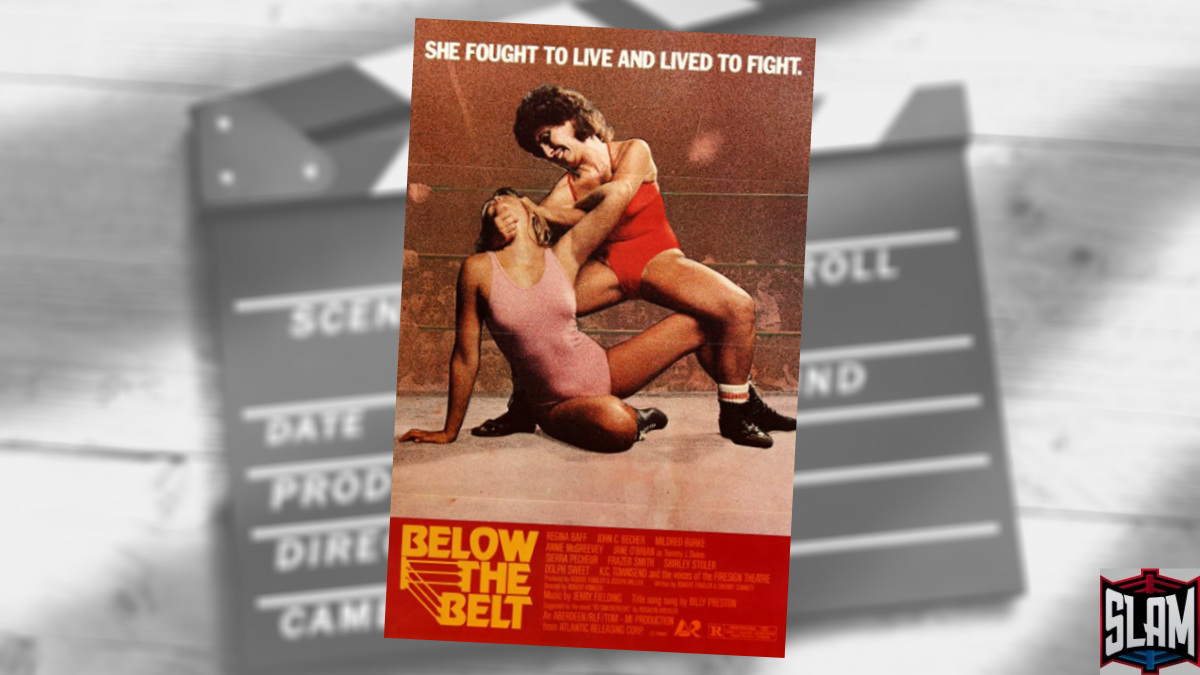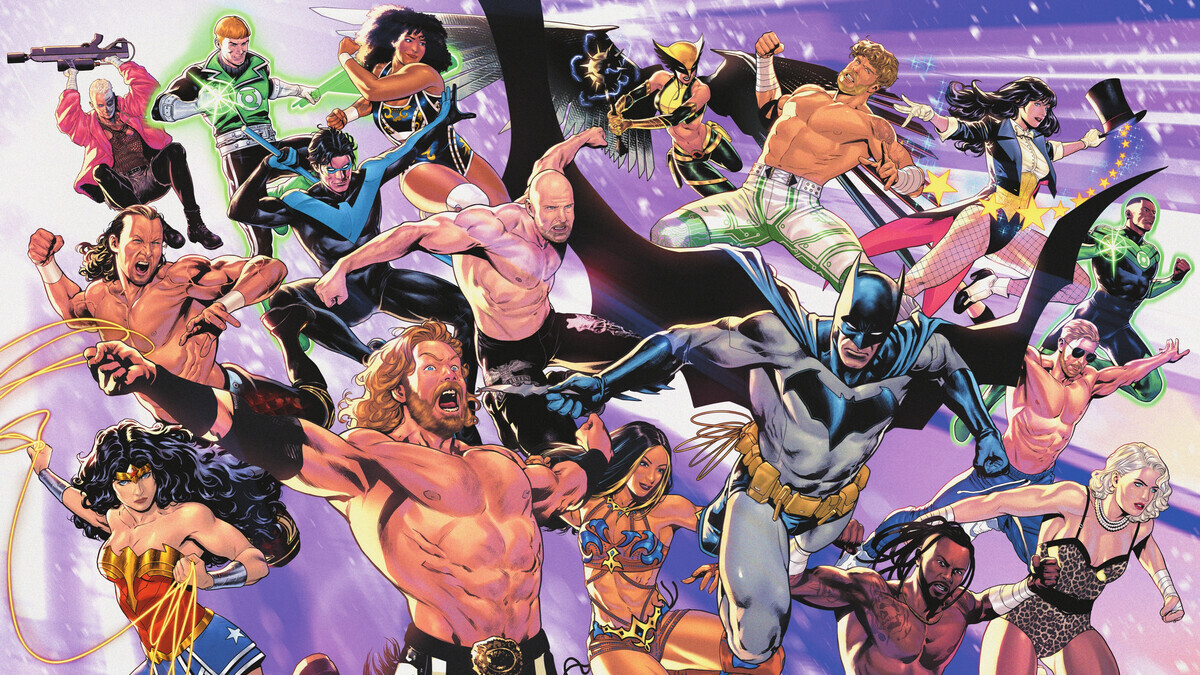Rewind Review: Below the Belt
The story of 1980’s Below the Belt begins with the real-life experiences of author and visual artist Rosalyn Drexler, who released a book titled To Smithereens based on her ventures into professional wrestling as “Rosa Carlo, The Mexican Spitfire.” The grueling nature of life on the road as a wrestler didn’t hold long-term appeal for Drexler, but she was able to turn her travels into her well-received book, which in turn caught the attention of film producers including Robert Fowler, who would also have a hand in writing and directing Below the Belt.
While Drexler moved on from wrestling and found her fame in visual arts (though not without some attention still paid to the athletes of the squared circle in some of her work), Below the Belt languished in post-production limbo. The film was completed in 1974, yet did not see release until 1980, thanks in large part to the success of the minor miracle that was 1976’s Rocky and its subsequent sequels. With an eye towards cashing in on a trend, Below the Belt was dusted off and finally came to life.
Again, though: this film was made before Rocky, and, most importantly, Drexler’s book was mining her own past for inspiration. That kind of detail matters when viewing, as everything in the movie is tinged with the same sense of street-level realism but isn’t, of course, derivative of Rocky. It’s cut from the same cloth, though, and in another interesting twist of fate, Drexler wrote the novelization of Rocky under the pen name Julia Sorel.
The movie opens with Rosa Robinski (played by Regina Baff), a seemingly listless diner employee handily dealing with a lecherous co-worker. Through happenstance, a wrestling promoter named Bobby Fox witnesses this and offers Rosa a try-out with Mildred Burke, who is playing herself in the film. Rosa talks it over with her boyfriend (a relationship soon to come to an end) and her step-father, who only questions the latest venture that Rosa’s trying out, with neither conversation leading to much help. The step-father is played, in a small, curious part, by Paul Brennan, who was featured in a landmark documentary from 1968 called Salesman about door-to-door bible peddlers.
Rosa finds her way to Millie Burke’s training gym, backed by the first of many outstanding musical numbers in the film performed by Billy Preston, Jennifer Holliday, plus Rodena Preston with The Voices of Deliverance. These tracks range from toe-tapping, spiritual-sounding pieces to more soulful, bluesy songs to suit the mood of the moment. Rosa’s first steps in the ring are good enough for her to join the troupe.
Rosa befriends The Beautiful Boomerang (Annie McGreevey), who provides an early indication of the loneliness this life can create. She doesn’t trust what men want from her, and after only a few days considers Rosa her best friend — it’s implied she doesn’t have much to choose from. When Rosa uncertainly replies to Boomerang’s profession of love for her, and it’s truly uncertain to the audience what she means by it as well, Boomerang and Rosa’s friendship hits a wall and is over as quickly as it began.
Rosa hits the road with an assortment of male and female wrestlers. She travels with Hilda (played by legit wrestler Titi Paris), Jane (renowned dancer Billie Mahoney), Trish (Shirley Stoler), Leroi (Dolph Sweet), Luke (James Gammon), and former wrestler turned Godfather darling Lenny Montana as The Geek. It’s an amazing assortment of characters, and though you may not recognize every name in the list, if you’re a movie fan of the era you’ll recognize most of their faces.
Towering over all of them is wrestler Jane O’Brien in the role of Terrible Tommy. She acts as the dragon at the end of the quest, someone who mocks, ridicules, and physically dominates Rosa throughout the film, all while Rosa knows she’ll have to face her to cement her place in the business.
While mentioned earlier that Below the Belt is mostly told in a non-traditional style, the one part it can’t escape is “the big fight” at the end of the movie. With wrestling as the main subject, that’s always a problematic element because it requires the story to use wrestling as a legitimately competitive sport rather than a choreographed business, and this note comes up again and again in reviews for wrestling-based films. Without the final fight, whether it’s Apollo Creed from Rocky or Zeus from No Holds Barred, there’s no-one for the protagonist to fixate on and work towards beating. However, that usually means that the rest of the film can’t really get into the staged nature of the sport.
Below the Belt plays this differently, as it’s one of the few films that both honors and exposes the performance part of the craft. Backstage at a show, Leroi and The Geek are stopped by a promoter who is demanding that they bleed in tonight’s match. The wrestlers insist on fifteen dollars extra each for the added color. The promoter first balks, then agrees. Rosa, remarking at the wild nature of the crowd, is assured with “Relax kid, it’s fake,” as those around her are busy putting on their Mongolian armor and practising their ferocious yells. Luke cries out in feigned indignation “I’m not a wrestler, darling, I’m an actor!”
It’s all very much an open book on the secret dressing room interactions of pro wrestling, especially for a 1974 production. Leroi, while listening to Rosa talk about being out of New York City for the first time, absent-mindedly opens a cut across his forehead to prepare for letting out blood in his match later. Shocked, Rosa can’t wrap her head around what he’s doing and all he does is laugh in response to her queries. Rosa is a wide-eyed visitor to this wild world, and through her we can question what keeps the wrestlers committed to it.
Through more music-led montages, the group tours the country, appearing in the ring mixed with clips of the greats of the day (Killer Kowalski with The Grand Wizard, Bruno Sammartino with Arnold Skaaland), but as Rosa rubs shoulders with the giants of the ring, her personal journey takes a dark turn. With no dialogue or music, just a lot of background noise, Luke is seen dressing himself and leaving a hotel room, with Rosa looking deflated holding a blanket up to her chin. There’s no context given, except that it’s obvious this wasn’t a scene of love.
The girls are travelling on their own with Verne Vavoom (Sierra Pecheur) behind the wheel, while from the “The more things change…” department comes a speech by Trish about her firearm, the best purchase she’s ever made. “They wanna take firearms away from ordinary citizens,” she ponders aloud. “They just understand these things better down here in the South.”
We’re reminded that a match with Tommy looms for Rosa, and with one week left to go, Fox wants to change up her image. He suggests they keep her first name but re-brand her as Rosa Carlo, The Mexican Spitfire — sound familiar? Three times she says she doesn’t like it, while Fox and Jane go ahead and re-name her anyway. The next road trip shot has the women looking tired, something that Leroi expresses to Verne in the dressing room as well. “I’m tired in a way that no man ever should be”. He wants to leave with her, having given twenty years to the road and the business and not having anything to show for it. Verne can’t leave and puts on a brave face until Leroi leaves her alone, where she breaks down.
Rosa hears about this and is scared, wondering whether she’s going to regret giving her life to this business too. Tio, played by veteran actor of mostly TV Ric Mancini, convinces her that there can be more to it than that. He lists off awards, pictures in magazines, people that know him from all over the country and that are glad to see him. “I put my name on a piece of paper and they’re happy,” he says. “It’s a lot.”
In the very end, the match with Rosa and Tommy almost doesn’t matter because the strength of the film is in the dynamics between characters and the look at those on the way up and those on the way down. Still, the movie does its best to present a main event fight that shows Rosa’s growth and her chance to prove herself.
An MGM property, Below the Belt will pop up now and then through services such as Amazon Prime. It’s a highly recommended find.
Below the Belt (1980)
| Tag Line: | She fought to live and lived to fight. |
| Directed By: | Robert Fowler |
| Written By: | Rosalyn Drexler (novel), Robert Fowler, Sherry Sonnet |
| Cast: | Regina Baff, John C. Becher, Mildred Burke, Jane O’Brien |
| Runtime: | 1 hour and 31 minutes. |




